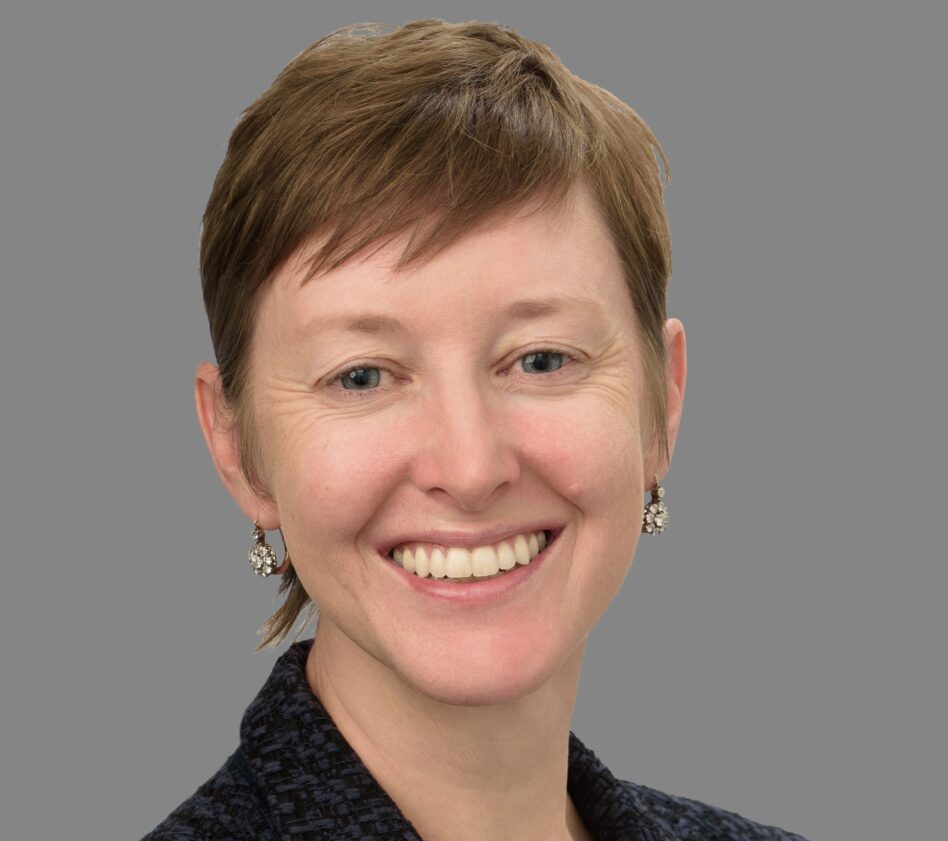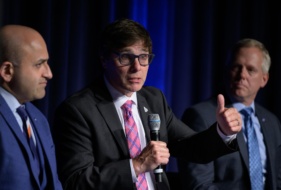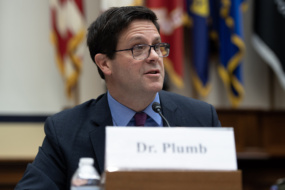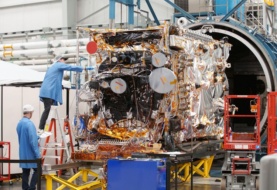Spire Global ($SPIR) may be in the space-based RF sensing business, but to COO Theresa Condor, it’s all about solving problems for real people down on Earth.
Condor has been making things tick at Spire since the early days of the company. Since becoming the company’s first COO in October 2021, she’s been hard at work making deals and keeping things running smoothly on the business end of a complex space business.
In a conversation with Payload, Condor discussed her journey from emerging markets finance, building a publicly-traded space company’s operations from the ground up, and the vast opportunity for space tech to help people at home.
Note: This interview has been edited for length and clarity.
Before joining Spire, you worked in emerging markets finance. What did that past life teach you about building a sustainable business?
I spent around three years living in Bangladesh, and that was a completely different experience. My other experience working in emerging markets was after I was in graduate school, when I worked in Citibank in trade finance—basically financing all the stuff that gets put on ships and moved around the world to grow global trade.
So I was sitting in New York doing that, but working in Latin America, working in developing economies in Asia. And I think both of those experiences you would think are completely unrelated—working in developing countries really related to development, finance, and then being on Wall Street. What I found interesting is that they’re very linked together. The stuff that I learned when I was doing development and finance helped me understand how important global trade and exports can be for the growth of developing economies.
Starting Spire after that made a lot of sense, because one of the very first things we started doing at Spire was collecting maritime data and tracking of ships that are moving all of these goods around the world.
Was there a particular catalyst for getting you engaged in or interested in space in particular?
I’m not interested in science fiction. I have no desire to go to Mars or to the Moon. I have no desire to go to the International Space Station. I care about what happens on Earth. I care about my life, and my kids’ life, and I care about macro economic growth. I care about me and you having a better life.
Between the stuff that I had been doing when I was in Bangladesh, what I was doing at Citibank, and then the maritime vessel tracking that we were then doing at Spire, I felt like okay, I can connect the dots. Because I saw on the ground in Bangladesh how trade impacted the lives of these people. And if Spire can help give greater visibility, greater transparency, greater efficiency to all of that, I can connect those dots to people being impacted positively.
Every geopolitical event happening today in the world is, to some extent, impacted by what’s going on in the space sector. And I can’t actually think of many other areas to work in that you can really, honestly say that.
When you joined Spire, what did you hope to accomplish? What did you dream of turning Spire into?
I think it was more of, like, “Let’s just get through it, not make the company fall apart, keep our rounds of funding growing and not be an embarrassment,” at the beginning.
I’m more practical about the work that we do to make everything happen. I find it very interesting that we are at the cutting edge of technology. We’re at this intersection of what is happening with digitalization, with AI, with talking about climate, even talking about defense and security issues.
I’m thinking about how can we make sure that in the space journey, we don’t screw it up and make it something that is not good, but that really does have an impact in the right way and push things forward in a good way for people’s lives. And it probably can go either way.
As Spire’s first COO, how did you go about originating that role and designing the company’s operations?
Given that we started from complete scratch, a lot of this stuff happens organically in response to how things evolve and how we grow. It’s not necessarily a master plan. It’s how do you get things done at the right time with the people that are there.
My role is really focused on the business side of the operation. So I’m not even a technology person. I’m someone who plans, talks to the customers, helps us set the strategy, and helps to guide overall where the business and execution is going. And so a lot of that, I think, comes from just that I did it myself at the very beginning when it was just a handful of us.
How do you explain to customers what is unique about Spire’s ability to meet their needs for space based intelligence?
I think it starts with having unique technology and a constellation in orbit that is providing operational datasets. Yes, it’s also talking about what a vision is, what will happen, how much more is coming, how this is having them interact with a sector that is growing that they should be interacting with. But, at the end of the day for customers, it comes down to what do you have? Does it work? Can I use it operationally? Can I count on it to make decisions about my business?
You can get the first conversation going by talking about satellites, by talking about space, by talking about all the changes that are happening in the sector. People read things in the news and they find it interesting, and so you can get the conversation going. But it has to move very quickly into, “What are you actually providing? What is the value? Does it help me save costs? Does it help me drive my own revenue forward? What am I getting compared to the alternatives? What problem is it helping me solve and how are you helping me do that in a better way?” Like all business conversations, it still comes down to that.
Where do you see the evolutions happening in Earth observation and in the demands of the marketplace in the next maybe five to 10 years?
There is so much potential and we’re still barely there yet on the Earth observation side. It will be more and more about datasets that are not just looking at historical archives, but are looking at fresh data and new data. And then it comes down to how do you analyze all that data, and very quickly get decisions? There’s still a lot of struggle with how to do that in a way that doesn’t require loads of expertise.
Some of that comes down to all the stuff that is happening with AI, and there’s a lot more to be done there. A lot of it also has to do with the overlay of different types of datasets. When we talk about EO, everyone immediately thinks of images, of pictures. And that’s where it started.
Where we have a bigger focus area is in radio frequency data, so listening to signals. That tends to fit in the telecommunication space, even though we’re using RF to do observations, weather, and climate data, so you’re starting to see a blurring of some of those categories.
What is also going to start being important is that you start merging more and more of these different types of datasets. So it’s not just, “Oh, we do analysis on optical imaging.” It will be, “We do analysis and help a business come up with an understanding and decision that merges optical and SAR and various types of RF data.” It will come down more and more to, ‘What is the problem and how is it helping arrive at the right decision to take in a timely way,’ and less about what the technique is.
You’ve sat on boards of women in leadership in the space industry and you’ve been active in those spaces. What changes or initiatives do you still think are necessary for the space industry to expand the opportunity for women?
It all starts with people studying the topics that are relevant, and being interested in those topics. So of course there’s a lot of talk about STEM and keeping students interested in that topic. That that education piece and inspiration piece continues to be important.
You need people who are not just in STEM in the space sector as well. That’s certainly not my background, and there’s a whole lot of other types of backgrounds that become necessary. A lot of it is just getting people interested and making people aware that it’s not just people that are really into Star Trek and want to go die on Mars or something. And it’s not some strange thing where you need to be a genius sitting in the corner in the room writing equations. You can have a lot of variety of backgrounds and interests. In fact, the space sector needs that.
What advice would you give a young woman looking to get involved in the space industry?
The first one is finding mentors along the way that can help you. It doesn’t matter if they’re women or men—they don’t have to fit some kind of mold. They have to be people who you find organically, that can help you push through, that can teach you, that can give you confidence and that help at critical points as you make career moves. That has helped me tremendously.
One of the other ones is to be hyper-prepared, and then to ask lots and lots of questions, because it always amazes me what questions people don’t end up asking. If you don’t ask, you don’t get an answer. It’s amazing what you can get done when you just are not afraid to just ask the questions.
The other one that I think is also really important is to not worry about what everyone thinks of you. That is a very powerful thing: to not constantly be comparing yourself to other people, or worrying what someone thinks of you, how smart you are or how you look or what you just said or what you did. It’s actually very liberating.




